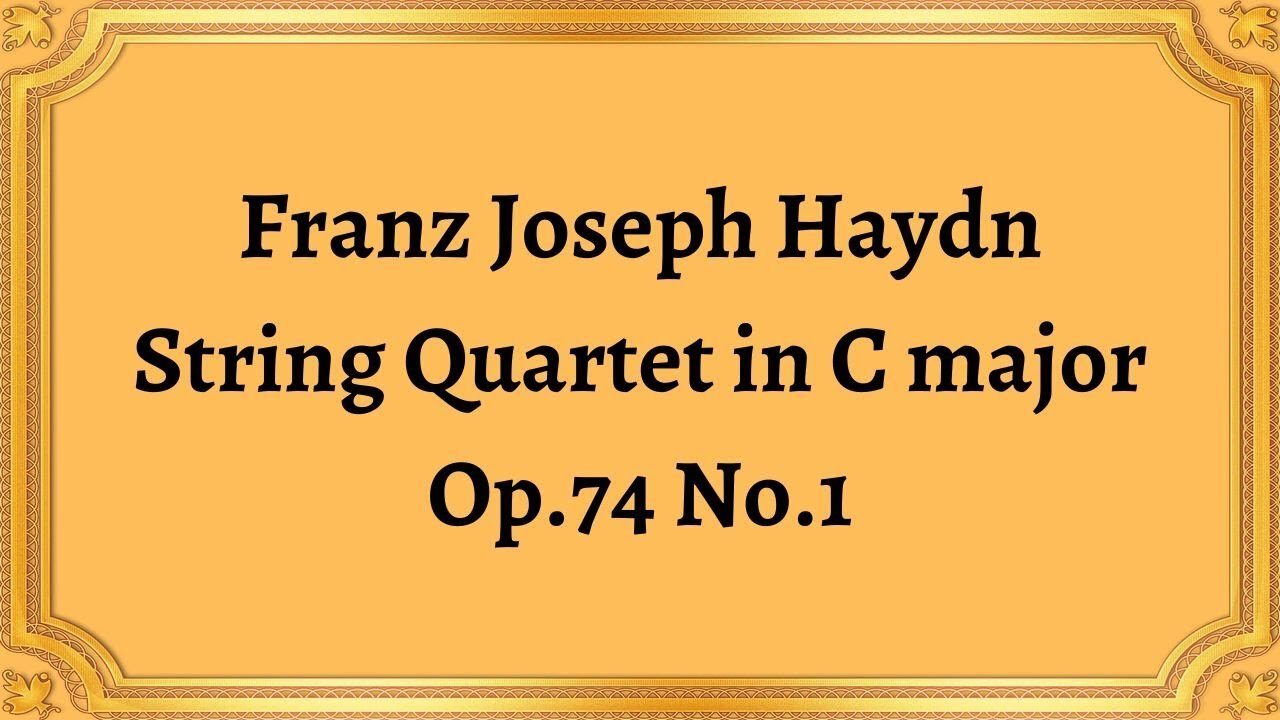Premium Only Content

Franz Joseph Haydn String Quartet in C major, Op.74 No.1
#FranzJosephHaydn #StringQuartet #Cmajor #Op74No1 #EmperorQuartet #ClassicalPeriod #Instrumentation #Harmonies #Counterpoint #RhythmicVariation #TechnicalSkill #MusicalIngenuity #AllegroModerato #PocoAdagio #Menuetto #Allegretto #ClassicalMusic #MusicHistory #OrchestralMusic #ChamberMusic #MusicalMasterpiece #PerformingArts #MusicEducation #MusicAppreciation #Musicologist
Franz Joseph Haydn was an Austrian composer and one of the most significant contributors to the classical period. The father of the string quartet, Haydn wrote a significant amount of music in this format, elevating it to an art form. One of his most celebrated pieces is the String Quartet in C major, Op.74 No.1, also known as the "Emperor" quartet. This masterpiece showcases Haydn's exceptional musical abilities and is a testament to his enduring legacy.
The String Quartet in C major is a four-movement piece, with each movement characterized by its unique mood and style. The opening movement, marked Allegro Moderato, begins with a bold introduction featuring an ascending major scale. The movement's primary theme, presented by the first violin, is striking and memorable, followed by a more lyrical second theme, presented in the second violin. Haydn masterfully develops these themes throughout the movement, leading to a triumphant finish.
The second movement is marked Poco Adagio, with a beautiful, serene melody that is played by the first violin. This melody is then elaborated upon by the other instruments, resulting in a harmonically rich and complex movement. The third movement, marked Menuetto, is a lively and playful scherzo that features dynamic rhythmic themes and driving rhythms. The final movement, marked Allegretto, is a fast, upbeat, and joyful piece that serves as a fitting conclusion to the quartet.
Haydn has a reputation for being a master of instrumentation, and the String Quartet in C major is no exception. He utilizes dynamic contrasts throughout the quartet, using the four instruments to create a rich and vivid tapestry of sound. His use of harmonies, counterpoint, and rhythmic variation is a testament to his musical ingenuity.
The String Quartet in C major, Op.74 No.1, was written during Haydn's later years and is considered one of his most significant contributions to music. It is a challenging piece for musicians, requiring a high level of technical skill, precision, and cooperation between the four players. This piece is often considered the pinnacle of Haydn's quartet compositions.
In conclusion, the String Quartet in C major, Op.74 No.1, is a masterpiece of the classical period, firmly cementing Haydn's status as one of the most renowned composers of all
You have the opportunity to support the channel https://destream.net/live/RadSiarAl/donate
-
 34:26
34:26
Classical music_Music Inspiration
3 months agoAram Khachaturian Concerto for Violin and Orchestra
1442 -
 LIVE
LIVE
Rebel News
4 days ago $7.08 earnedELECTION NIGHT LIVE: Rebel News Canada coverage with Ezra Levant, Sheila Gunn Reid & Special Guests
31,805 watching -
 LIVE
LIVE
TimcastIRL
46 minutes agoDemocrat LAUNCHES IMPEACHMENT Against Trump Citing Deportation, Abrego Garcia Case | Timcast IRL
14,468 watching -
 LIVE
LIVE
vivafrei
21 minutes agoELECTIONS CANADA RESULTS LIVE STREAM WITH VIVA COMMENTARY!!!
1,956 watching -
 1:33:55
1:33:55
Glenn Greenwald
6 hours agoGaza Starves, Pro-Israel Propagandists Escalate Extremist Rhetoric and Actions | System Update #444
13.6K42 -
 LIVE
LIVE
megimu32
2 hours agoON THE SUBJECT: This Timeline is Broken: Epstein, Aliens & Summer Anthems
200 watching -
 1:02:42
1:02:42
Donald Trump Jr.
7 hours agoMAHA Means Business, Interview with Calley Means | TRIGGERED Ep.237
69.4K38 -
 57:50
57:50
BonginoReport
4 hours agoFAKE News In A Downward Ratings Spiral - Nightly Scroll w/ Hayley Caronia (Ep.36)
38.3K26 -
 LIVE
LIVE
The Jimmy Dore Show
2 hours agoTrump Tariffs Working As Planned? Trump Open to Raising Taxes on the Rich! w/ Stephen Gardner
10,941 watching -

Dr Disrespect
9 hours ago🔴LIVE - DR DISRESPECT - TRIPLE THREAT CHALLENGE - WZ, PUBG, FORTNITE
123K11